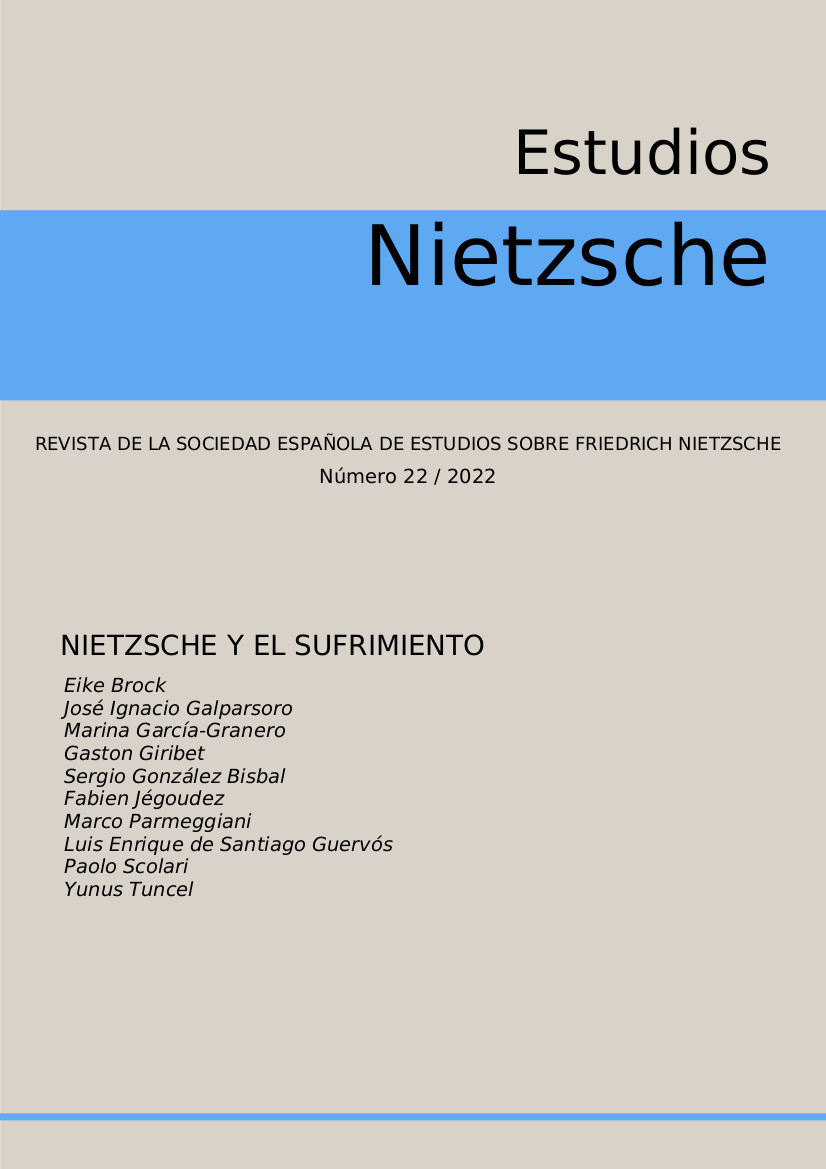“Great suffering” and “great health” in Nietzsche’s thought
DOI:
https://doi.org/10.24310/EstudiosNIETen.vi22.14279Keywords:
Nietzsche, great suffering, great health, overmanAbstract
The solution to the problem of the dwarfing of human being does not pass through the elimination of suffering, but rather through training in what Nietzsche calls “great suffering”. Sickness is a paradigmatic case of suffering that can serve as a stimulus to life. Thus, health cannot consist merely in the elimination of sickness. “Great health” is the concept used by Nietzsche to describe the state reached by someone who is capable of enduring “great suffering”: the “overman”.
Downloads
Metrics
References
ÁVILA CRESPO, REMEDIOS (2001): “De la muerte de Dios al superhombre. El sufrimiento y la risa en el ‘Zaratustra’ de Nietzsche”, en: Estudios Nietzsche, I, pp. 13-31.
CARRILLO CANÁN, ALBERTO J.L. (2002): “Dolor y sufrimiento en Nietzsche o la crianza del héroe”, en: Elementos: Ciencia y cultura, junio-agosto, año/vol 9, número 046, pp. 25-31.
ESTEBAN ENGUITA, JOSÉ EMILIO (2020): “La risa de Zaratustra”, en: Revista de Filosofía, 45(2), pp. 285-299.
FAUSTINO, MARTA (2011): “Philosophy as a ‘Misunderstanding of the Body’ and the ‘Great Health’ of the New Philosophers”, in: Joao Constâncio & Maria Joao Mayer Branco (eds.), Nietzsche on Instinct and Language, Berlin/Boston: De Gruyter, pp. 203-218.
FAUSTINO, MARTA (2014): “Da Grande Saúde. A Transvaloração Nietzschiana do Conceito de Saúde”, en: Estudios Nietzsche, Curitibia, v. 5, n.2, pp. 257-286, jul/dez. 2014.
GALPARSORO, JOSÉ IGNACIO (1995): “La volonté de puissance chez Nietzsche: tentative d’une explication naturaliste du monde”, en : Les Études philosophiques, 4/1995, pp. 457-480.
JANAWAY, CHRISTOPHER (2007): Beyond Selflesness. Reading Niezsche’s Genealogy. Oxford: Oxford University Press.
HAN, BYUNG CHUL (2021): La sociedad paliativa. Madrid: Herder.
LETTERI, MARK (1990): “The theme of Health in Nietzsche’s Thought”, en: Man and World, vol. 23, no 4, pp. 405-417.
MONTEBELLO, PIERRE (2001): Vie et maladie chez Nietzsche. Paris : Ellipses.
NIETZSCHE, FRIEDRICH (2016): Obras Completas I. Madrid: Tecnos.
NIETZSCHE, FRIEDRICH (2014): Obras Completas III. Madrid: Tecnos.
NIETZSCHE, FRIEDRICH 2016): Obras Completas IV. Madrid: Tecnos.
NIETZSCHE, FRIEDRICH (2010): Fragmentos póstumos III. Madrid: Tecnos.
NIETZSCHE, FRIEDRICH (2006): Fragmentos póstumos IV. Madrid: Tecnos.
Official Records of the World Health Organization, Nº 2, June 1948. Summary Report on Proceedings. Minutes and Final Act of the International Health Conference, Held in New York from 19 June to 22 July 1946 (https://apps.who.int/iris/bitstream/handle/10665/85573/Official_record2_eng.pdf;jsessionid=374C3EED1EA5CC9A7ECE1723D043B423?sequence=1). (Consultado el 19/01/2022).
PASLEY, MALCOLM (1978): “Nietzsche’s Use of Medical Terms”, en: Malcolm Pasley (ed.): Nietzsche: Imagery and Thought. London: Methuen, pp. 123-158.
SEVERINO, EMMANUELE (1986): La filosofia contemporanea. Da Schopenhauer a Wittgenstein. Milano: Rizzoli
SLOTERDIJK, PETER (2009): El pensador en escena. El materialismo de Nietzsche. Valencia: Pre-textos.
SLOTERDIJK, PETER (2012): Has de cambiar tu vida. Sobre antropotécnica. Valencia: Pre-Textos.
STEGMEIER, WERNER (2008): “Schicksal Nietzsche? Zu Nietzsches Selbsteinschätzung als Schicksal der Philosophie und der Menschheit (Ecce Homo, ‘Warum Ich Ein Schicksal Bin’ 1)”, en: Nietzsche-Studien 37 (2008), 62–114.
STIEGLER, BARBARA (2001): Nietzsche et la biologie. Paris: PUF.
TUNCEL, YUNUS (2017): “Pain and Suffering in Nietzsche and Transhumanism”, in: Yunus Tuncel (ed.), Nietzsche and Transhumanism: Precursor or Enemy?, Cambdrige: Cambridge Scholars Publishing, pp. 220-229.
WOTLING, PATRICK (2012): “Le problème fondamental : la réaction face à la souffrance”, en: Patrick Wotling: Nietzsche et le problème de la civilisation. Paris: PUF, pp. 139-156.
Downloads
Published
How to Cite
Issue
Section
License
As of issue 21 (2021) this journal is published only in open access (diamond route).
From that number 21, like the previous numbers published in NIETZSCHE STUDIES, they are subject to the Creative Commons Acknowledgment-NoComercia-ShareIgual 4.0 license, the full text of which can be consulted at <http://creativecommons.org/licenses/by-nc-sa/4.0 >
It is the responsibility of the authors to obtain the necessary permissions of the images that are subject to copyright.
This work is licensed under a Creative Commons Attribution-NonCommercial-ShareAlike 4.0 International License.
Copyright generates two different rights: moral rights and patrimonial rights that EJFB recognizes and respects. Moral rights are those relating to the recognition of the authorship. They are rights of a personal nature that are perpetual, inalienable, unseizable and imprescriptible as consequence of the indivisible union of the author and his/her work.
Patrimonial rights are those that can be derived from the reproduction, distribution, adaptation or communication of the work, among others.







11.png)
